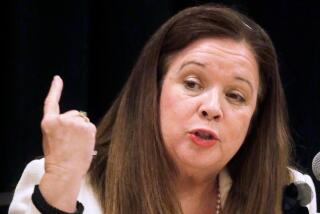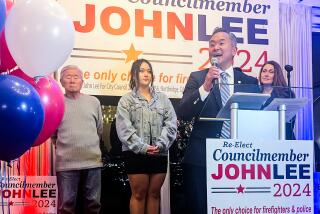A multitasking city attorney
- Share via
The Los Angeles city attorney does at least two and arguably three jobs. He is the city’s advocate in court; the legal advisor to the mayor, City Council and government agencies; and the chief prosecutor of misdemeanors in the city. The office’s functions are so disparate that there are periodically calls to break it up, to make the city’s counsel an appointed position while still electing the city’s prosecutor.
That idea is not before voters this spring, but four candidates are: incumbent Carmen Trutanich, former Assemblyman Mike Feuer and private lawyers Greg Smith and Noel Weiss. We’ll endorse soon in that race. Before doing so, it seems worth taking a moment to consider what it is they’re competing for, and how to evaluate success in a position that is as important as it is opaque.
First, the city attorney represents the city in lawsuits and threats of lawsuits. This is where Trutanich has staked his biggest claim for reelection. He contends that his office has won “favorable verdicts” in 134 of 147 cases that have gone to court on his watch. (Sometimes he cites a slightly different tally, saying he’s won favorable outcomes in 112 of 129 cases.) Those are intriguing statistics, illustrative of an office that has, by all accounts, fought hard in court and resisted the temptation to settle cases early. All of which is to Trutanich’s credit.
VIDEO: Interviews with L.A.’s mayoral candidates
That said, the numbers are not quite as illuminating as they might seem. Start with the phrase “favorable verdicts.” To some, that might connote cases the city attorney won. Not so. What it means is cases in which the final judgment was less than the last offer made in settlement negotiations. Let’s say a plaintiff sued the city for $100 million and negotiated with the city attorney’s office over a settlement, asking for $75 million to resolve the case. If the city attorney rejected that offer and took the case to trial, and the jury or judge awarded the plaintiff $50 million, Trutanich would count that as a favorable verdict that saved the city $25 million. True enough, but it’s also true that the city, in that instance, would pay out $50 million, and it’s not necessarily clear whether that payout reflects its genuine exposure or the city attorney’s bad negotiating tactics.
The hypothetical above illustrates another aspect of why it’s difficult to judge the performance of a city attorney. As the lawyer for the city government, the city attorney represents a client. His success — or hers, though no woman has ever held the office — depends largely on the behavior of his client. If police officers shoot unarmed suspects or Fire Department employees feed a black colleague dog food as part of a prank (yes, that actually happened), it’s not their lawyer’s fault. Given that, how can voters assess a city attorney based on payouts for city lawsuits? The answer is not easily reduced to numbers. Residents are entitled to a city attorney who defends the city’s interests forthrightly and aggressively, recognizing that there are times when misconduct must be paid for.
What about the city attorney as counselor to the government? Here, we offer a challenge to the next city attorney, whoever he is. Los Angeles’ lawyer needs to represent agencies, departments and politicians, but he also represents the people of the city, and the latter responsibility should impel the holder of the office to make the government’s business as public as possible. That has a particular meaning at this moment in time. It was not long ago that records of shootings and other uses of force by police officers were routinely made public, and access to police disciplinary hearings was similarly available. Based on ambiguous rulings from state courts and restrictive interpretations by the city attorney’s office, those records and proceedings now are largely off-limits to the public. Such access fostered public confidence in police and helped the Los Angeles Police Department shed its image as an occupying force. We call upon the candidates for city attorney to pledge their commitment to returning public oversight to the city’s agencies most in need of such scrutiny.
And then there’s the issue of the city attorney as prosecutor. It’s trite to evaluate prosecutors solely based on their conviction rates. Instead, what we’re looking for is someone who approaches these issues with creativity, common sense and a commitment to justice. When we endorsed Trutanich for city attorney four years ago, we did so partly based on his commitment to the neighborhood prosecutor program, which is intended to bring prosecutors closer to the issues actually troubling communities by locating them in offices around the city. In some areas, abating prostitution might be a priority; in others, graffiti might be the dominant problem. Neighborhood prosecutors help communities target what matters most to them. Sadly, the program has been cut, though responsibility for that is shared by the city attorney, the mayor and the City Council, all of which have had to manage budget reductions in recent years.
The next city attorney will perform many important and diverse duties, as have his predecessors. We’re looking for someone who can perform them all.
More to Read
A cure for the common opinion
Get thought-provoking perspectives with our weekly newsletter.
You may occasionally receive promotional content from the Los Angeles Times.









